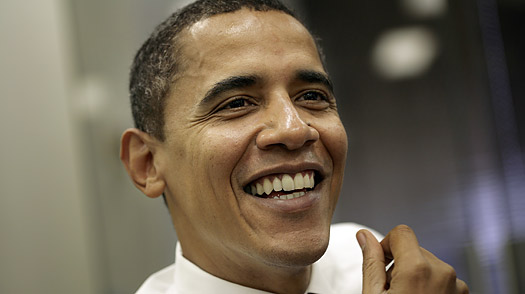
(4 of 6)
Yes, Obama could talk — like nobody's business — but talk didn't win the election. According to the daily tracking polls, the tumblers clicked into place precisely at the moment the financial hurricane hit, when the wizards of Wall Street proved as incompetent as Oz and neither the President nor the leaders of Congress nor the Treasury boss nor Senator McCain could deliver a rescue package. When this group failure provoked a stock-market crash in early October, Americans asked, "Can't anybody here play this game?" Astounding as it would have seemed scant months before, their gaze fell on the one fixed point in the widening gyre: a guy named Barack Hussein Obama. (See pictures of Barack Obama's family tree.)
III. Fear Itself
As White House Chief of Staff during the final years of the Clinton Administration, John Podesta became accustomed to short nights and emotional roller coasters. Still, he found it a bit strange to be headed to the airport in the predawn darkness of Nov. 5 — just a few hours after the election of a Democratic President. Was Obama really going to chair a major strategy session the morning after winning the longest and most grueling campaign on record? How about a day off?
Long before Election Day, Obama decided that an ordinary transition wouldn't do. Given the shaky economy and two wars, he knew that the winner of the election — whoever it turned out to be — would face instant and daunting challenges. He wanted to be ready. "What I was absolutely convinced of was that, whether it was me or John McCain, the next President-elect was going to have to move swiftly," Obama recalls. He deployed Podesta in midsummer to lead an unusually elaborate preparation for a possible Obama presidency. McCain accused him of overconfidence and vanity, of measuring the Oval Office drapes. To Obama, it was simply a matter of prudence. (See pictures from the historic Election Day.)
Podesta had long been planning the return of a Democrat to the White House, and his think tank, the Center for American Progress, was already preparing detailed briefings on conditions in the various departments of government. As the financial system went into free fall in September, Podesta's team pressed the FBI to work overtime on security screenings of potential Obama nominees. Now, as he boarded a 6 a.m. flight to Chicago, Podesta carried a list of more than 100 candidates who had passed their background investigations and were ready for confirmation on Day One. Instead of taking a day off, the new President-elect celebrated his victory with a five-hour meeting.
Obama had been pondering whether he should step to center stage or wait in the wings as the turbulent last months of the Bush Administration played out. His aides were all over the map. Some advised him to go quietly about his business in Chicago and insist that America has just one President at a time. For Obama to succeed, they argued, the country needed to see his Inauguration as a clean break, a new sunrise. Others floated the idea of immediately starting the First Hundred Days, perhaps asking George W. Bush to appoint Obama's choices to key offices so that they could get to work by late November.
Obama was leery of appearing to shoulder responsibility for problems before he had any real authority to fix them. Bush's bank of political capital was busted, and Obama wasn't about to take ownership of the toxic assets. On the other hand, he didn't want to repeat the dysfunctional transition of power from Herbert Hoover to Roosevelt in the dark hours of the Great Depression. F.D.R.'s silence between his election and his Inauguration may have deepened the crisis. By 5 p.m. on Nov. 5, when Podesta walked out of that meeting — not 24 hours after the polls closed — Obama was far ahead of the normal transition process, having homed in on finalists for many of his key staff and Cabinet positions. But he hadn't yet decided how public to be about it.
Within two days, however, events forced his hand. On Friday, Nov. 7, Obama convened a meeting of his economic advisers in Chicago, and the tone of their comments was chilling. The stock market was plunging; credit remained tight; fresh unemployment numbers were shocking. "There was just a very dramatic deterioration" in the days after the election, says Timothy Geithner, Obama's choice for Treasury Secretary. On previous occasions when the group had gathered, someone could always be counted on to find potential upsides in dismal forecasts, while Paul Volcker, the 81-year-old former chairman of the Federal Reserve, reliably closed each meeting with a gloomy soliloquy. On this day, though, there was no positive scenario for Volcker to deflate. Everyone in the room was grim.